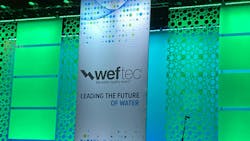WEFTEC 2024 kicks off with opening general session
The Water Environment Federation's (WEFs) annual WEFTEC show started on Monday, October 7, 2024, in New Orleans, Louisiana.
The event started with the opening general session where speakers focused on sharing personal water stories relating to water quality, quanitity, variability and accessibility.
WEF highlighted in the opening session that a primary goal is for everyone to live free of water challenges.
Ghassan Khorban, executive director of the sewerage and water board of New Orleans, started the sessions and spoke about the effects of saltwater intrusions, climate change, regulatory changes and other challenges to the water industry.
"Our industry is facing a changing world," Khorban said.
Aimee Killeen, president of WEF, took the stage and talked about what to expect at WEFTEC.
Killeen spoke about the importance of water stories across the U.S. and the importance they carry.
"It's our repsonsibility as people in the water sector to tell our stories," Killeen said. "If we don't tell our water stories, someone else is telling the stories for us."
Killeen spoke about how her family rooted themselves on an island in the Gulf of Mexico and how it impacted her future in the water industry. She talked about having to wear old shoes when she was in the water due to tar. Killeen knew something was wrong about eating food from the tar ridden water.
Killeen talked about climate change and the cost it has on infrastructure.
She talked about hurricane anxiety and talked about her experience with Hurricane Ida.
The first water story came from Errick Simmons, mayor of Greensville, Mississippi.
Simmons talked about water security across the U.S. and how it has personally affected him and his city over the years, referencing the flooding from 2016.
"Cities along the Mississippi are in unique situations to solve problems," Simmons said. He stated that the resolutions lay in restoring the ecology.
"It takes people all across my city, the Mississippi and the country to tackle these problems," Simmons said. "We will continue to cling to our river, because it's our past, present and future."
The second water story came from Jessica Duggan, who is an active member of the United Houma Nation.
She gave a history of the Houma nation and how water was an important resource for them. Water provided a source of income via the fishing industry, as well as a source of transportation.
"We lose a football field size of land every 100 minutes," Duggan said, talking about how swamps and water effect their land resources.
"Losing our land is losing our culture," Duggan said. She noted the importance of protecting that culture.
The third water story came from Kelvin Davis, New Zealands first minister for Maori crown relations.
He talked about the water problems that the tribe has faced. Davis noted that the Maori draws water from different locations for different purposes. Drinking water comes from a different location than water for laundry.
Davis talked about legislation in New Zealand on making the Whanganui River a living person. This means that the river would need to be treated like a living person. The legislation would prohibit anyone from abusing the river as it's technicaly considered a person.
The fourth water story came from WEF Executive Director Ralph Exton.
Exton spoke about how he focused on mechanical engineering while he was in college.
"Water makes all those mechanical things that I love rust," Exton said when referencing his first job out of college doing water engineering.
Exton remembered his first WEFTEC and spoke about how the engineering behind the products is still memorable to him still to this day.
"I wanted to have a bigger impact and be more direct," Exton said. "That's why I joined WEF."
Exton talked about his influence on WEF and stated that WEF has influenced him.
"The key takeaway for me from my water story is to get involved," Exton said.
Aimee Killeen took the stage again to conclude the opening session stating that it's up to the people in the water industry to solve water problems.
Killeen challenged the people in the room to tell their water stories.
The session ended with music from Corey Ledet, who played a genre of music that emerged from southwest Louisiana called Zydeco.
